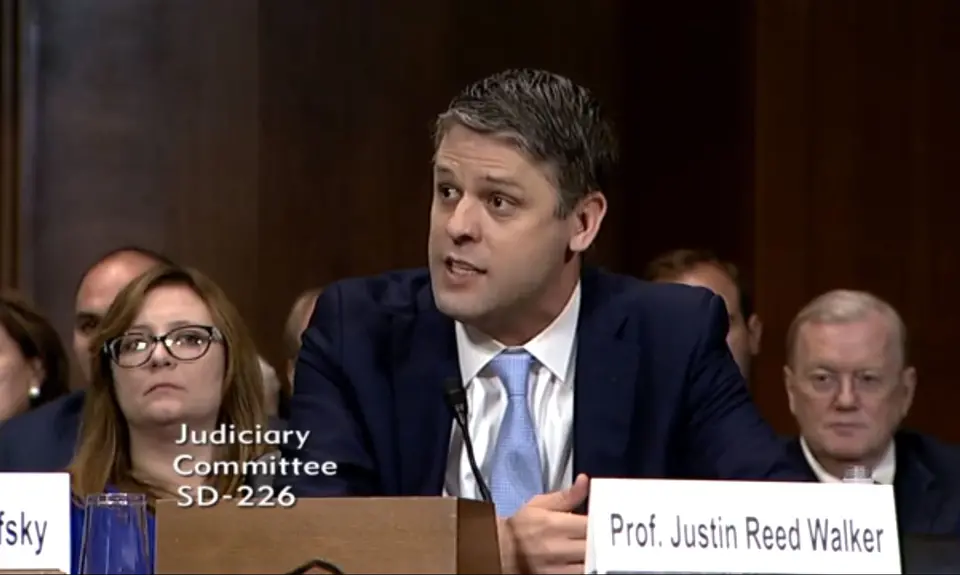On June 24, President Trump nominated Justin Walker to be a U.S. district court judge for the Western District of Kentucky. The Senate Judiciary Committee held Walker's hearing on July 31 and is expected to schedule his committee vote for the week of September 9. People For the American Way wrote to committee members to express our opposition to the Walker nomination. You can download our letter here.
Dear Chairman Graham, Ranking Member Feinstein, and Committee Members:
On behalf of our 1.5 million supporters nationwide, People For the American Way opposes the nomination of Justin Walker to be a U.S. district court judge for the Western District of Kentucky.
Walker joins the long list of President Trump’s judicial nominees who have been found unqualified by a nonpartisan panel of the American Bar Association.i The ABA’s qualifications regarding experience are applied equally to all judicial nominees, regardless of party. They have always made clear that they consider 12 years of experience in the practice of law to be a minimum requirement for a district court judge. But Walker hasn’t even been out of law school that long, and he has almost no courtroom experience. At his hearing, Walker claimed his academic work makes up for his inexperience. However, the ABA disagrees, as it explained in a letter to the Judiciary Committee:
[H]is legal practice to date does not compensate for the short time the nominee has practiced law and/or his lack of substantial courtroom experience.ii
Walker is a former clerk for then-D.C. Circuit Judge Brett Kavanaugh, and he regularly promoted Kavanaugh’s nomination to the Supreme Court on television and in print.iii The legal positions he approvingly attributed to Kavanaugh make clear the kind of judge Walker himself would be.
Walker praised Kavanaugh for his D.C. Circuit dissent in the main Affordable Care Act case as a “thorough and principled takedown of the mandate” that served as a “roadmap” for the four Supreme Court dissenters who would have struck the ACA down.iv Walker wrote that Kavanaugh’s “courageous and influential opinions on countless different issues—presidential power, regulatory overreach, religious liberty, the Second Amendment, and the list goes on—leave no doubt that he would be a forceful conservative justice for decades to come.”v Walker praises Kavanaugh’s opposition to Supreme Court precedents allowing Congress to delegate authority to agencies, requiring courts to defer to agency interpretations (the Chevron doctrine), and upholding the creation of independent agencies whose leaders cannot be fired by the president without cause.vi
Essentially, Walker’s jurisprudence would undo the New Deal and undercut the constitutionality of a wide array of health and safety protections and reasonable limitations on corporate power.
Even after credible allegations of sexual assault were made against Kavanaugh, Walker did not believe they disqualified him from the Supreme Court. He wrote that “[Kavanaugh] would not lie to get a job,”vii despite documentation that Kavanaugh had lied under oath during his D.C. Circuit confirmation hearings about his knowledge and receipt of material stolen from committee Democrats while he was in the White House.viii
Walker went even further and suggested that the FBI should investigate Ranking Member Dianne Feinstein to determine how Christine Blasey Ford’s name was leaked to the press.ix Someone who called for such a blatantly political use of our nation’s law enforcement should never be considered as a federal judge. It is essential for the preservation of our democracy that neither the FBI nor any other part of the Justice Department be used to attack the president’s political enemies.
Yet Walker would empower the president to do just that. After President Trump fired the FBI director in his effort to derail investigations into the Trump campaign’s potential coordination with Russia, Walker wrote an article opposing the independence of the FBI.x At his hearing, Sen. Hirono asked him directly whether it is acceptable for a president to ask the FBI director to “go easy” on his political allies. Although this would be a clear abuse of presidential authority and potentially criminal obstruction of justice, Walker refused to give a substantive answer.xi
Walker has also strongly suggested that constitutional interpretations are correct when they align with his personal policy preference for smaller government. An example is his praise for the Supreme Court’s ruling in DeShaney v. Winnebago County, in which the Court ruled that the Due Process Clause does not require the state to protect people from the actions of private actors. He agreed with the holding not because it was consistent with the text, meaning, purpose, or history of the Fourteenth Amendment, but because it “ensure[d] that the federal courts will not be among the many other accelerants on the size of local, state, and federal government.”xii Similarly, the basis of his criticism of the argument that the Equal Protection Clause requires governments to spend as much on public education in impoverished areas as it does in wealthy ones was that it would “require each state to raise taxes by billions of dollars.”xiii
Justin Walker’s record shows that he would approach constitutional interpretation with an agenda, and it is an agenda he shares with Brett Kavanaugh and so many other Trump judicial nominees: to serve the interests of the wealthy and powerful rather than protect the rights of every American. The Senate should reject his nomination.
Sincerely,
Marge Baker
Executive Vice President for Policy and Program
